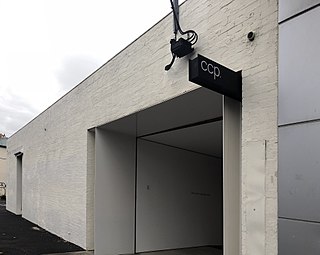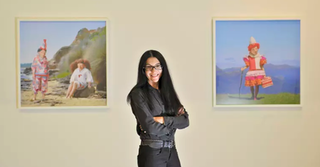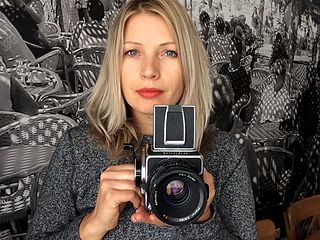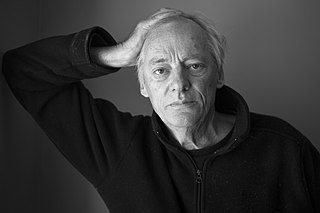Exhibitions
This section of a biography of a living person needs additional citations for verification .(November 2015) |
Selected solo exhibitions
- 500 Strong, Geelong Art Gallery, Shepparton Art Museum, curated by Jane Scott, 2022 [12]
- Changing Faces, Bayside City Council Chambers, Melbourne, 2020 [17]
- Our Mums and Us and These Women have Just Run 26 Miles, Monash Gallery of Art, Melbourne, Australia, 2013
- Eros, Philos and Agape, Melbourne Cricket Ground, 2012
- Basil Sellers Creative Arts Fellow, National Sports Museum, MCG, 2011–12
- More seeing is NOT Understanding, Monash Gallery of Art, Brisbane Powerhouse, Portland, Redlands Qld, Albury, 2009
- Seeing Is Not Understanding, Horsham Regional Gallery, 2009
- Trading Places, Heritage Hill Museum, Dandenong and Immigration Museum, Melbourne, 2006
- Risk, Monash Gallery of Art, 2005
- Sensation, Chrysalis Gallery, East Melbourne, 2005
- They're downstairs, North Melbourne Arts House, 2003
- Todah, Jewish Museum, St Kilda, Melbourne, 2001
- St Vincent’s at Home, Aikenhead Gallery, Melbourne 1999
- Relatively Speaking, The Family in Words and Pictures, Chrissie Cotter Gallery, Sydney, and Centre for Contemporary Photography, Melbourne, 1998
- Photoworks, Victoria University Gallery, Melbourne, 1997
- Circus Oz, Performing Arts Museum Collection, Westpac Gallery, Victorian Arts Centre, Melbourne, 1997
- Best Mates, William Mora Gallery, Melbourne, 1990
- Generations, National Gallery of Victoria, Melbourne, 1989
- Circus Oz in Performance, La Trobe University Gallery and Watters Gallery, Sydney, 1981
- Our Mums and Us, Brummels Gallery, Melbourne 1976
Selected group exhibitions
- Flesh After Fifty, Changing Images of Older Women in Art, Abbotsford Convent, Melbourne, Australia, 2021
- Photography Meets Feminism: Australian women photographers 1970s–80s, A Monash Gallery of Art travelling exhibition, 2014–2015
- Beyond Borders, MAP Group, Ballarat International Photo Biennale, 2015
- Melbourne Now National Gallery of Victoria, 2013–2014 [6]
- KHEM, Strange Neighbour, Melbourne, Curated by Linsey Gosper, April 11 – May 3, 2014 [19]
- Take A Bow, Ballarat Mechanics Institute, 2013
- Mining The Collection, Albury City Gallery, 2011
- Brummels, Monash Gallery of Art, 2011
- Mapping Ballarat, Ballarat Foto Biennale, 2011
- Basil Sellers Art prize, (finalist) Ian Potter Museum of Art, 2011
- Timelines, National Gallery of Victoria, 2011
- Mapping Ballarat, Ballarat International Foto Biennale, 2009
- Beyond Reasonable Drought, Old Parliament House, Canberra and touring, 2007
- Raised by Wolves, Art Gallery of Western Australia, 2006
- Julie Millowick Aquisitive Prize, Castlemaine Festival (winner), 2006
- Murray Cod: The Biggest Fish in the River, Swan Hill Gallery and 5 other venues, 2006
- Blake prize for Religious Art (finalist), 2006
- Josephine Ulrick and Win Schubert Photographic Award, Gold Coast City Art Gallery (finalist), 2006
- Olive Cotton Award for Photographic Portraiture, Tweed River Art Gallery, Murwillumbah (finalist), 2006
- Making Hay at Shear Outback Center, Hay, NSW, and Span Galleries, Melbourne, 2006
- The Interior World: photographs and photographers from Glen Eira City Council's Collection, Glen Eira City Gallery, Caulfield South, Melbourne, 2004
- Documenting Australians, A pictorial history of Australian photography, Monash Gallery of Art, Wheelers Hill, 2002
- Images of Australian Men, Photographs from the Monash Gallery of Art collection, travelling exhibition, 2002
- Exhibit X – Group Photographic Exhibition, Lab X Gallery, St Kilda, 2002
- So You Wanna Be a Rock Star, National Portrait Gallery, Canberra, 2002
- Ordinary Women, Extraordinary Lives, Melbourne Museum, touring 10 venues, 2001
- Woman Photographers, Monash City Gallery, 2000
- Feminist Art, RMIT First Line Gallery Melbourne, 1999
- Three Melbourne Photographers, Ballarat Festival, Ballarat, 1997
- The Power to Move, Aspects of Australian Photography, Queensland Art Gallery, Brisbane, 1996
- Six Photographers, Barry Stern Gallery, Sydney, 1995
- On the Edge, Australian Photographers of the Seventies, from the collection of the National Library Australia, San Diego Museum of Art, San Diego, 1994
- All in the family – Selected Australian Portraiture, National Library of Australia, Canberra, 1994
- Domain of the Other, National Gallery of Victoria, Melbourne, 1992
- Defective Models – Australian Portraiture 19th and 20th Centuries, from regional, university and private collections, Monash University Gallery, 1990
- Portrait Photography, National Gallery of Australia, Canberra, 1989
- The Thousand Mile Stare, Australian Centre of Contemporary Art, Melbourne, touring Art and Working Life, Roar Studios, Melbourne, 1988
- Shades of Light – Photography and Australia 1839 to 1988, Australian National Gallery, 1988
- Living in the Seventies, Australian National Gallery, Canberra, 1986
- Australian Photographers, Australian National Gallery, Canberra, 1984
- Photographic Work, Perc Tucker Gallery, Townsville The Critical Distance, Artspace Sydney, 1983
- Melbourne Theatre Photographers, Ministry for the Arts, Melbourne, 1982
- Eight Woman Photographers, Monash University Gallery, Melbourne and Developed Image, Adelaide, 1981
- Woman's Work, La Trobe University Gallery, Melbourne, 1981
- Self Portrait/Self Image, Victorian College of the Arts, Melbourne and touring, 1980
- 100 Artists, Panel Beaters Gallery, Melbourne, 1978
- New Conceptualists, Tokyo, 1977
- Sister’s Delight, Media Resource Centre Gallery, Adelaide, 1977
- Woman Photographers, Pram Factory, Melbourne, 1976










